Memoirs require depth and not merely
what transpired during the slice of life being recounted through story. The writer needs to look up from her
reminiscing, and explain the wider experience and the meaning of it to the
reader.
College wasn’t for me or my
siblings. We were not encouraged to
attend college right out of high school.
There was no money for higher education in my house growing up. We four children were told we had our
education, and it was time to enter the workforce. My siblings and I accepted it; we had no other
choice. Most of the children in my
neighborhood did the same thing in the late 1970’s, especially the
females. My family didn’t know about
community college, never went looking for it.
Through light backstory, intermixed
with feelings on this, I could expound upon what it felt like to be left by the
roadside on the journey to a formal degree.
I always wondered what it would have been like to live on campus and
study. Of course at that time, I had no
idea how extensive a college education was, how expensive. It looked exciting to me because it was just outside
my grasp. College was for the wealthy,
my family had always said.
On a personal level, I looked for
education wherever I could find it, wherever I could afford it. The law office where I worked talked about
sending one of the secretaries to paralegal training offered locally. I jumped at the chance and told the office
manager I would do it. But then the
lawyers decided against it.
To add depth to my memoir about going to college with five children in tow, I could research the history of my local community college or perhaps the birthing of community colleges in general; the two year colleges that possibly helped make higher education more affordable for the masses, and then add snippets of information--not in a solid block, but rather throughout my experiences. In a later section of the book, I could compare the idea of local community colleges to the 300 plus year history of the University of Pennsylvania, an international university, an Ivy League, part of the ivory tower in education that I thought I could never reach.
To add depth to my memoir about going to college with five children in tow, I could research the history of my local community college or perhaps the birthing of community colleges in general; the two year colleges that possibly helped make higher education more affordable for the masses, and then add snippets of information--not in a solid block, but rather throughout my experiences. In a later section of the book, I could compare the idea of local community colleges to the 300 plus year history of the University of Pennsylvania, an international university, an Ivy League, part of the ivory tower in education that I thought I could never reach.
Let's take a look at a few of the
memoirs I’ve been reading and see how well-known writers interpret their
stories. I find the writers connecting beyond their own experiences in order to
make sense of the larger themes of belonging, of learning from those who
struggled before them.
In Beth Kephart’s Still Love in Strange Places,
Kephart describes the very land where her husband grew up and connects the
volatility of the land to the political tensions of El Salvador. The turmoil of the country mirrors Kephart’s
trial to understand her husband’s culture, to feel a part of her husband’s
culture.
In Colleen Carroll Campbell’s
memoir My Sisters the Saints, Carroll
Campbell connects her experiences grappling with her Catholic faith in the
context of personal difficulty and tragedy with various saints down through the
centuries, demonstrating that Carroll Campbell is not alone in her struggles.
These thoughts dance across my
dreams as I continue to read memoir and hammer away at my revisions. Your thoughts are always welcome and greatly
appreciated.








.JPG)